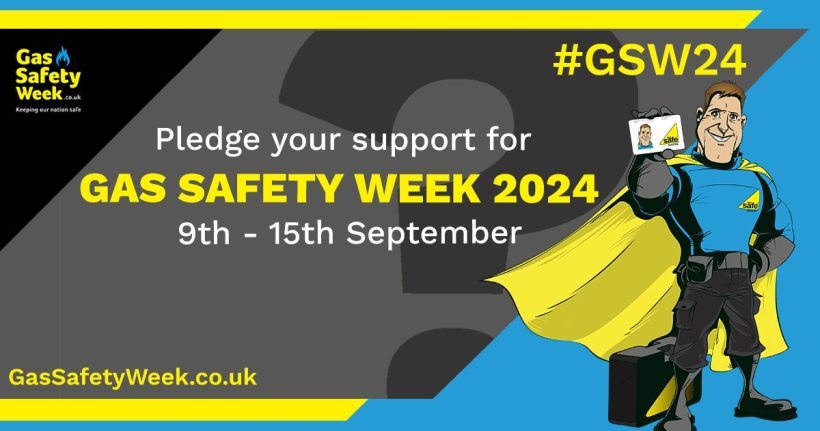Anton by Crowcon has pledged its support for Gas Safety Week (9th-15th September 2024) to raise awareness about the importance of gas safety.
Gas Safety Week is here to remind the public how to keep themselves gas safe, and organisations across the nation are working together to raise awareness of the dangers of poorly maintained gas appliances, which can cause gas leaks, fires, explosions and carbon monoxide (CO) poisoning.
This year for Gas Safety Week, the theme is ‘Checking—Every Check Counts’, emphasising the importance of, amongst other things, regular gas safety checks. The theme highlights the significance of checking all gas appliances and encouraging people to prioritise gas safety in their homes. By showing how important every check is, Gas Safety Week aims to raise awareness and promote measures to ensure the safety and well-being of households.
Jonathan Samuel, Chief Executive Officer for Gas Safe Register, said: “This is the fourteenth Gas Safety Week and the theme for 2024 is Checking – Every Check Counts. The week will encourage checking, in many guises, and shine a light on the importance gas safety in keeping ourselves and our community safe. Throughout Gas Safety Week, our partners, stakeholders and Gas Safe Register will share information to help everyone be gas safe, so I am very pleased to have the support of Anton by Crowcon to help share those messages, such as check the Gas Safe Register to ensure your engineer is registered and qualified.”
By taking care of your gas appliances properly you are taking care of your home and your loved ones. No matter how big or small every check counts. Here is a guide to some simple checks that you can do at home:
- Check that you’ve had an annual gas safety check. Gas appliances should be safety checked once a year and serviced regularly by a Gas Safe registered engineer. Tenants, make sure your landlord arranges this.
- Check your engineer is Gas Safe registered. Always use a Gas Safe registered engineer and ensure they’re qualified for the work that needs doing via the Gas Safe Register website and the engineer’s ID card.
- Check for warning signs that could indicate your gas appliances are not working correctly. Signs may include lazy yellow/orange flames instead of crisp blue ones, black marks on or around the appliance, a pilot light that keeps going out, too much condensation in the room, or error messages on the appliance’s control panel.
- Check that vents or flues are not blocked. Vents and flues are there to ensure your gas appliances work safely. Blocking them could prevent this.
- Check your knowledge. Remember the six main symptoms of carbon monoxide poisoning: headaches, dizziness, breathlessness, nausea, collapse, and loss of consciousness.
- Check your carbon monoxide (CO) alarm. Regular testing ensures that alarms are operational and capable of alerting you to the presence of deadly CO. Also, check they are marked to standards EN50291 and still in date (if applicable).
- Check before doing DIY. Before drilling or hammering, check that there is no risk of hitting a gas pipe. Never DIY on a gas appliance, if you suspect
there is something wrong with your appliance or it is not working correctly, call a Gas Safe registered engineer. You can find one at co.uk or call 0800 408 5500.
Keep up to date with Gas Safe Register’s updates and advice throughout Gas Safety Week by following @GasSafeRegister on Facebook, Twitter and Instagram and search #GSW24 and #GasSafetyWeek.
Gas Safe Register is the official register for legally qualified engineers. You can find a registered engineer in your area by visiting the Gas Safe Register website at GasSafeRegister.co.uk.
For more information about Anton by Crowcon contact
Tel: 01235 557780
Email: anton@antonbycrowcon.com
For more information or press enquiries concerning Gas Safe Register and/or its spokespeople, please contact GSRPR@kindredagency.com.
Gas Safe Register is the registration body appointed by the Health and Safety Executive to manage the register of qualified gas engineers in the UK, Isle of Man, Guernsey and Jersey. It is a legal requirement for anyone carrying out domestic and commercial gas work to be registered and comply with the Gas Safety (Installation & Use) Regulations 1998. The register of more than 150,000 gas engineers held by Gas Safe Register aims to protect people from unsafe gas work. Gas Safe Register assesses the competence of engineers by inspecting the gas work they have carried out to make sure they are safe to work on gas. Gas Safe Register is focused on gas safety and campaigns to raise awareness of gas safety risks associated with using illegal gas workers.
Gas Safe Register deals with all aspects of the downstream gas industry covered by the Gas Safety (Installation and Use) Regulations 1998. It covers both piped natural gas and liquefied petroleum gas (LPG). www.GasSafeRegister.co.uk
Follow us on Twitter @GasSafeRegister | @GasSafetyWeek

